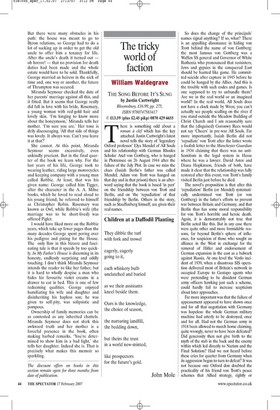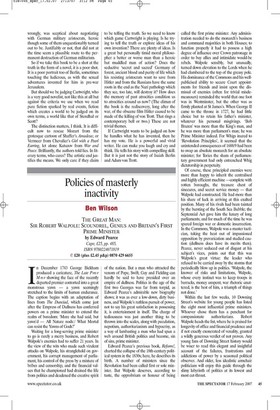The tric world of faction
William Waldegrave THE SONG BEFORE IT'S SUNG by Justin Cartwright Bloomsbury, £16.99, pp. 275, ISBN 9780747583417 © £13.59 (plus £2.45 p&p) 0870 429 6655 There is something odd about a roman a clef which has the key attached. Justin Cartwright's latest novel tells the story of 'legendary Oxford professor' Elya Mendel of All Souls and his relationship with German Rhodes Scholar Axel von Gottberg, who is hanged in Plotzensee on 26 August 1944 after the failure of the July Plot. In case we miss the clues (Isaiah Berlin's father was called Mendel; Adam von Trott was hanged on that day and in that prison) there is an afterword saying that the book is based 'in part' on the friendship between von Trott and Berlin, and on `the 'repudiation' of that friendship by Berlin. Others in the story, such as Stauffenberg himself, are given their real names.
So does the change of the principals' names signal anything? If so, what? There is an appalling dissonance in hiding von Trott behind the name of von Gottberg: the most famous von Gottberg was a Waffen SS general and Governor of White Ruthenia who pronounced that resisisters, Jews and gypsies in the conquered East should be hunted like game. He committed suicide after capture in 1945 before he could be hanged by the Allies. And this is the trouble with such codes and games. Is one supposed to try to unbundle them? Are we in the real world or an imagined world? In the real world, All Souls does not have a clock made by Wren; you can't actually see people sculling on the river if you stand outside the Meadow Building of Christ Church and I am reasonably sure that the (disguised) Goronwy Rees would not say 'Cheers' in pre-war All Souls. Far more importantly, Isaiah Berlin did not 'repudiate' von Trott after the latter wrote a foolish letter to the Manchester Guardian in 1934 claiming that there was no antiSemitism in the legal system in Hesse where he was a lawyer. David Astor and Diana Hopkinson, friends of both, have made it clear that the relationship was fully restored after this event; von Trott's family visited Berlin just before he died.
The novel's proposition is that after this 'repudiation' Berlin (or Mendel) systematically undermined von Trott (or von Gottberg) in the latter's efforts to prevent war between Britain and Germany, and that Berlin thus has some moral responsibility for von Trott's horrible and heroic death. Again, it is demonstrably not true that Berlin acted like this. But in any case there were quite other and more formidable reasons, far beyond Berlin's sphere of influence, for suspicion of those who sought an alliance in the West in exchange for the removal of Hitler and endorsement of German expansion in the east as a bulwark against Russia. At one level the Venlo incident of 1939, when a disastrous SIS operation delivered most of Britain's network in occupied Europe to Gestapo agents who were pretending to be dissident German army officers hawking just such a scheme, could hardly fail to increase scepticism about later approaches.
Far more important was that the failure of appeasement appeared to have shown once and for all that negotiation with Germany was hopeless: the whole German military machine had utterly to be destroyed, once and for all. Had not the German army in 1918 been allowed to march home claiming, quite wrongly, never to have been defeated? Did generosity then not give birth to the myth of the stab in the back and the enemy within which led directly to Nazism and the Final Solution? Had we not heard before these cries for quarter from Germany when its aggression began to turn to defeat? It was not because one Oxford don doubted the practicality of his friend von Trott's peace schemes that Allied strategy, rightly or wrongly, was sceptical about negotiating with German military aristocrats, heroic though some of them unquestionably turned out to be. Justifiably or not, that did not at the time seem a plausible route to the permanent destruction of German militarism.
So if we take this book to be a shot at the truth in the form of a novel, it is a poor shot. It is a poor portrait too of Berlin, sometimes touching the ludicrous, as with the sexual adventures invented for him in pre-war Jerusalem.
But should we be judging Cartwright, who is a very good novelist, not like this at all but against the criteria we use when we read pure fiction sparked by real events, fiction which creates a world to be judged on its own terms, a world like that of Stendhal or Scott?
The distinction matters, I think. It is difficult now to rescue Mozart from the grotesque cartoon of Shaffer's Amadeus; or Vermeer from Chevalier's Girl with a Pearl Earring, let alone Kutuzov from War and Peace. Brilliantly, the authors told lies. In literary terms, who cares? The artistic end justifies the means. We only care if they claim to be telling the truth. So we need to know which game Cartwright is playing. Is he trying to tell the truth or explore ideas of his own invention? There are plenty of ideas. Is a great but personally timid moral philosopher a better or worse man than a heroic but muddled man of action? Does the seductive 'secret and sacred' Germany of forest, ancient blood and purity of life which his resisting aristocrats want to save from Hitler and from the Russians have the same roots in the end as the Nazi pathology which they see, too late, will destroy it? How does the memory of past atrocities condition us to atrocities around us now? (The climax of the book is the rediscovery, long after the war, of the obscene film Hitler caused to be made of the killing of von Trott. That rings a contemporary bell or two.) These are not trivial themes.
If Cartwright wants to be judged on how he handles what he has invented, then he has my vote. He is a powerful and vivid writer. He can make you laugh and cry and think. He tells his story with compelling skill. But it is just not the story of Isaiah Berlin and Adam von Trott.


























































 Previous page
Previous page